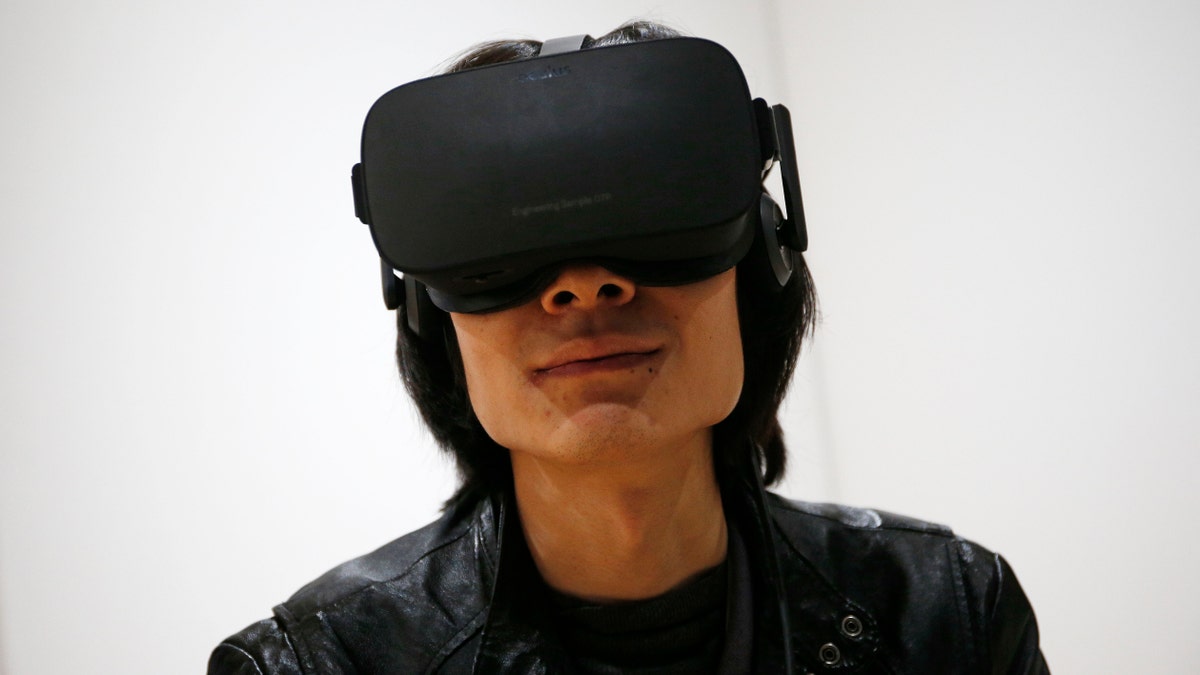
File photo - Peijun Guo wears the Oculus Rift VR headset at the Oculus booth at CES International, Wednesday, Jan. 6, 2016, in Las Vegas. (AP Photo/John Locher)
Oculus is shipping the long-awaited Rift but it comes with flaws typical of first-gen products, according to initial reviews from major tech sites.
After repeated delays, customers have finally started receiving the Rift virtual reality (VR) package. That's the good news. The bad news is the Facebook-owned outfit will be struggling to meet demand as ship dates are already pushed back to the second quarter, according to Rift’s order page.
Oculus Rift is one of the most-watched tech product releases this year because it’s the first consumer VR rig that allows you to walk through virtual space. And it heralds a future where you interact with virtual reality participants around the world in a so-called "fully immersive" VR world.
The problem is, the future isn’t here yet, at least according to a few high-profile reviews.
Related: Is the new iPad Pro too expensive?
“The Rift demonstrates flashes of a brilliant future where we can move freely through countless virtual worlds. But…a week with the Rift showed me it still needs to dig itself out of some deep holes,” said the Wall Street Journal in its review, which also cited a “glitch” with the sensor.
The Journal went on to say that though the Rift is an impressive piece of engineering, it “still just isn’t that good at convincing you you’re in an alternate reality.” And, as with all new technology, after you get past the initial wow stage, rough edges become more apparent. “Using the 1.5-pound headset is about as awkward as sleeping on an airplane,” the Journal said.
Which is a common theme in other reviews. The first-gen package has an unwieldy cable that can literally trip you up if you’re not careful. “You’re going to have a 12-foot cord following you as you move around,” wrote TechCrunch in its review.
And little things can burst the VR bubble. “I found that the space for the nose in the viewport leaked quite a bit of light in,” TechCrunch said, detracting from the feeling that you’re fully immersed in a virtual world.
Related: Samsung Galaxy S7, S7 Edge review roundup
Other gotchas that undermine the immersive-reality experience include the limit on the VR space you navigate in. "The biggest problem is that it’s impossible to tell where that space ends until you step outside it, causing a sickening jerk as the world stops responding to your motion,” The Verge review said.
Another big hurdle for consumers will be cost. If your PC isn’t up to snuff (which is the case for the vast majority of laptops), a bundle that includes an Oculus Ready PC and a Rift starts at $1,499.
Of course, it’s not all carping and criticism. Once you get all the necessary hardware, “the actual setup is really a breeze,” said TechCrunch.
And one of the best parts of the Rift experience is the Oculus Touch controllers. “A pair of Wii Nunchuk-style positionally-tracked controllers,” according to TechCrunch, which describes them as the “most ergonomic and intuitive of any input devices I’ve seen thus far.” And The Verge agrees, saying there is a “promising future game catalog with Touch controllers.”
Related: Giant future iPhone 7 could get bendable display tech, report claims
Though even this big upside has its downside: the controllers won’t launch until later this year.
But Rift will not by any means be limited to gaming. Battlefield, tourism, and space exploration will likely emerge as popular applications. Medicine – and who knows what else – is also ripe for VR. So, the future seems almost limitless at this point.
